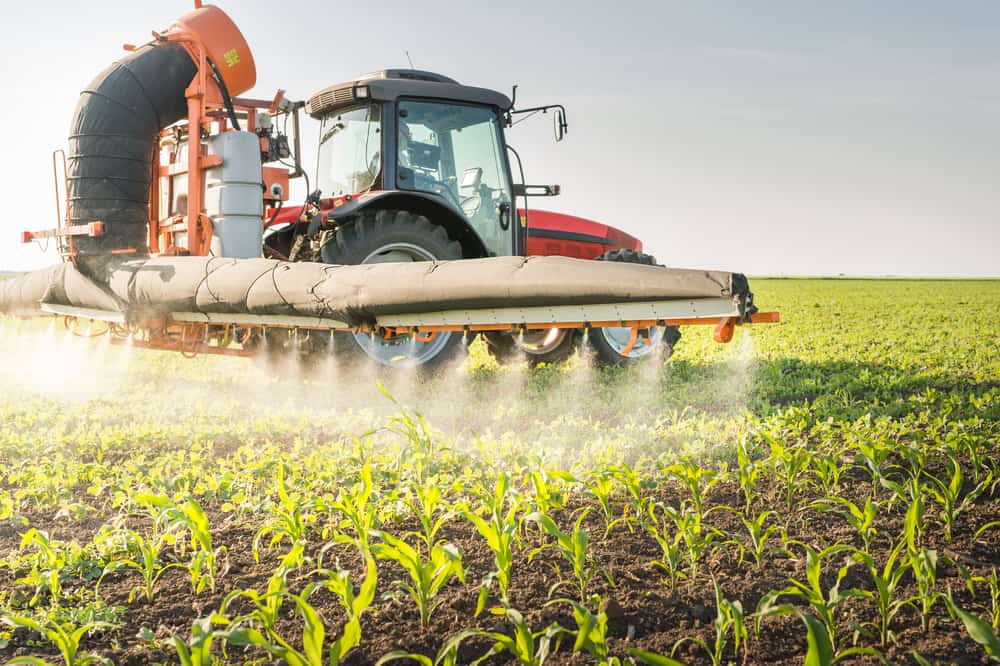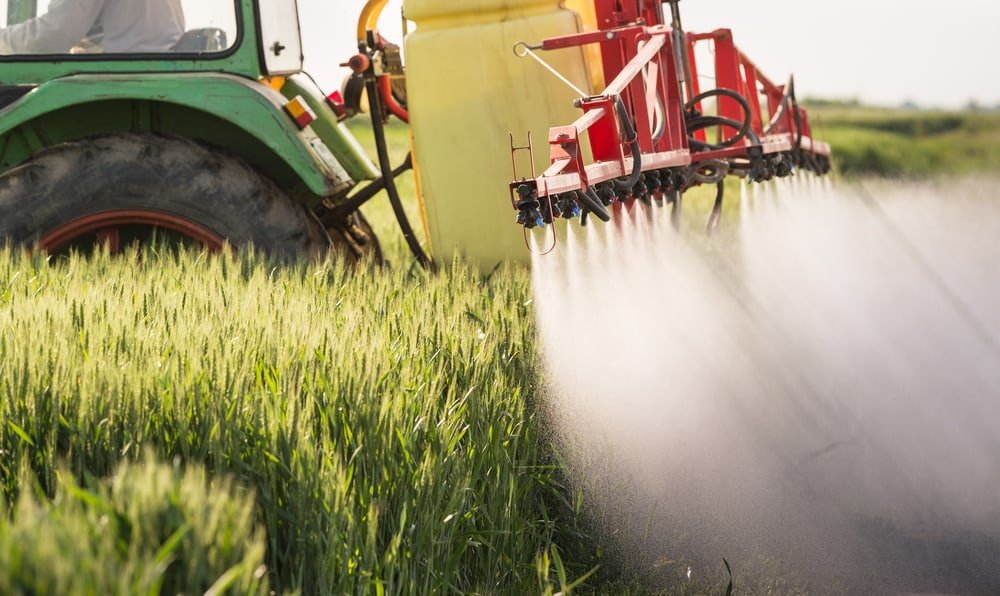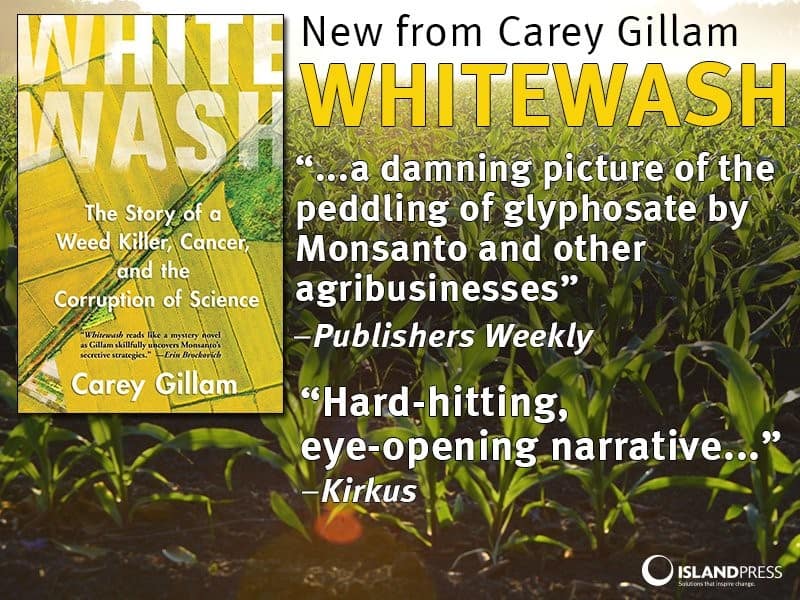It’s the pesticide on our dinner plates – a chemical so pervasive it’s in our air, our water, our food, and even our own bodies. Glyphosate, the main ingredient in Monsanto’s Roundup weed killer, is the most widely used agrichemical in history.
For decades it’s been lauded as the chemical that’s “safe enough to drink.” When I was a reporter back in the 90s, living in a beautiful mountain town in Colorado, I learned just how little our government leaders understood about the health effects of the chemicals they were spraying all over public areas.
I asked a town manager exactly what it was they were spraying on school lawns. “Oh just Roundup,” he told me. “You can buy that at Walmart so it must be safe!”
Unfortunately for the kids who run and play in those fields, and for all of us who eat glyphosate-sprayed GMO foods, a growing body of scientific research ties glyphosate to cancers and a host of other health and environmental threats.
We have a right to know the truth about the chemicals we’re exposed to through our food, water and air.
That’s why I’m excited to share an important new book written by one of the bravest investigative reporters I know, and also my friend, colleague and fellow mom Carey Gillam, “Whitewash: The Story of a Weed Killer, Cancer, and the Corruption of Science.”
Disclosure: This post contains affiliate links to Amazon.
Beautifully written and impeccably researched, Whitewash explores the legal claims of thousands of Americans who believe Roundup caused their cancers, and exposes the powerful influence of a multi-billion-dollar industry that has worked for decades to keep consumers in the dark.
Gillam, a former Reuters reporter and current research director for consumer watchdog group US Right to Know (where I also work), traces the corruption of science in startling detail, uncovering stories of how chemical companies have taken advantage of “useful” government employees and censored or discredited scientists to bury evidence of harm.
Her investigation reveals how political influence has been at work for years in regulatory agencies such as the FDA, USDA, and even within the EPA — the very agency created as a result of Rachel Carson’s findings in Silent Spring.
Whitewash also lays bare unappetizing truths about the levels of glyphosate and other pesticides commonly found in our food products.
Glyphosate in our food: the controversial herbicide has been found in
One message comes across loud and clear from the revelations in Whitewash: we can’t trust the food corporations to look out for our health and the government agencies that are supposed to protect us are not living up to the job. It’s up to us to protect ourselves and our families.
Choosing organic when possible is the best way to avoid glyphosate and other synthetic chemicals in food.

Documents expose decades of deception
Whitewash is the culmination of what Gillam has learned from 20 years of reporting on Monsanto and from thousands of pages of company documents obtained via the USRTK investigations and her research, and from the Monsanto Papers being released from legal actions.
“Jaw-dropping is the best way to describe some of the documents I and others have uncovered,” Gillam says.
“Seeing behind the curtain, reading in their own words how corporate agents worked intentionally to manipulate science, to mislead consumers and politicians, was shocking. As a long-time journalist, I’m a bit of a hardened cynic. Still, the depth of the deception laid bare in these documents, and other documents still coming to light, is incredible.”
Gillam was recently called to appear before a joint committee of the European Parliament to explain her research and what the documents reveal about the many ways Monsanto has worked to manipulate the science on glyphosate.
Her powerful 16-minute presentation is a useful primer for understanding the tricks corporations like Monsanto use to deceive the public, media and regulators about the safety of their products.
- See video and slideshow of Carey Gillam’s presentation, “Decades of Deceit: Revelations from the Monsanto Papers and Other Research.”
As Gillam told the European Parliamentarians, “I can confidently tell you that the story of the company’s top selling chemical, glyphosate, is not one of truth, but one of deceit – carefully calculated and choreographed deceit. There is overwhelming evidence of attempts to deceive, and to do so in ways that manipulate the press and manipulate policy makers like you.”

Members of the European Parliament will vote next week on whether to allow the reauthorization of glyphosate. The parliament’s environment committee has proposed a phase-out of glyphosate, starting with a complete ban on household use and a ban in use for farming by 2020.
Here in the United States, the federal government is unlikely to take action any time soon, but hearings will commence in December in a multi-district lawsuit filed by people alleging that exposure to Roundup herbicide caused them or their loved ones to develop non-Hodgkin lymphoma, and that Monsanto covered up the risks.

Champions for health
“Whitewash reads like a mystery novel as Gillam skillfully uncovers Monsanto’s secret strategies,” says environmental activist Erin Brockovich. “I am hopeful that Carey’s book will be a wake-up call for more transparency about the dangers surrounding many chemicals in the marketplace.”
As Gillam notes in the preface, Whitewash is not a feel-good story. But it’s one that needs to be told.
“For me, Whitewash is more than an exposé about the hazards of one chemical or the actions of one company,” she says. “It’s also a call to remember the lessons of Rachel Carson and Silent Spring as evidence mounts that we are in a very precarious point as the push for pesticide dependence and the drive for corporate profits take precedence over people’s lives and our environment.”
In telling this difficult story with such grace, Gillam is also reminding us of the impact one woman can make when she speaks truth to power.
This post was written by Stacy Malkam of US Right to Know.



 We Need to Talk About Fluoride and the Load of BS You Are Being Fed About It
We Need to Talk About Fluoride and the Load of BS You Are Being Fed About It